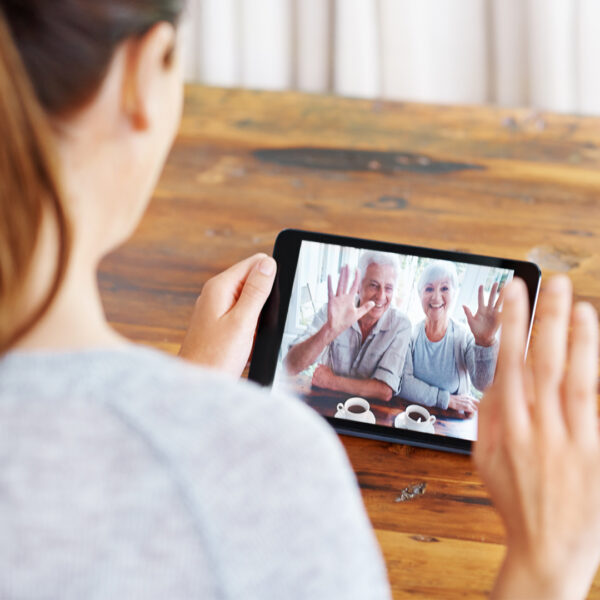When it comes to hearing loss, a loved one’s support, empathy and encouragement play an important role in helping patients make a decision about a cochlear implant. No one can attest to this more than Audiologist and Cochlear Clinical Services Senior Manager, Dr. Arun Joshi.
Dr. Arun Joshi splits his time between clinical care and management of Cochlear Hearing Centers in both Houston and San Antonio. Dr. Joshi knows first-hand the important role companions play when deciding about a hearing solution. In this interview, he tells us why loved ones are such an integral part of the patient experience, and what to remember if you are a patient wanting to get your family members or friends more involved in the process.
 When it comes to hearing loss, it can be tough to know when it’s time to encourage your loved one to make an appointment. Do you have any tips for how friends and family can encourage their loved ones to meet with a hearing professional?
When it comes to hearing loss, it can be tough to know when it’s time to encourage your loved one to make an appointment. Do you have any tips for how friends and family can encourage their loved ones to meet with a hearing professional?
“It would be important for loved ones of candidates to understand that a cochlear implant evaluation provides a candidate with information about how they can improve their hearing and their quality of life and that participating in an evaluation does not mean they are going to immediately ‘sign-up’ for cochlear implant (CI) surgery. Rather, one of the purposes of the cochlear implant evaluation is for the patient to learn about the options that are available to improve their hearing. During the appointment, a licensed audiologist evaluates the amount of benefit they are receiving from hearing aids and determines if different hearing technology, such as a cochlear implant, would provide them with improved hearing. If a cochlear implant is recommended, it is up to the patient to determine if they would like to consider the recommendation further. It is helpful for friends and family members to encourage their loved ones to attend such appointments so they can educate themselves about the potential for improved hearing. Remind them that knowledge is power!”
 Why is it important for a loved one to be a part of the patient’s hearing journey?
Why is it important for a loved one to be a part of the patient’s hearing journey?
“It’s important to have loved ones present in the appointment – they can provide a second set of ears and reaffirm what we’re saying. It gives this extra oomph of ‘What this doctor is saying has value and is true, it relates to your case, and we need to implement it because it will help you.’”
“It’s very helpful when loved ones are able to assist with remote care tools1, which enable us to communicate with patients in their home setting. We often rely on a loved one, such as a child, caregiver, grandchild, etc., to be the one who can help us with technology, such as smart phones2. As audiologists, we recognize that more people have access to telehealth resources and other digital tools when loved ones can provide guidance and support.”
What would you say to a candidate who is unsure whether or not to bring their loved one along to their appointments?
“It’s so helpful when someone accompanies a patient to their appointment. They know their family member better than we do, and they can let us know if the message we are delivering is unclear or needs to be explained in a different way. They can share the information with other family members and reinforce the information and the counseling message at home. Four ears are better than two!”
If a loved one is not initially supportive, do you still recommend they join the appointment anyway?
“I would first want to understand why the loved one may have objections. In my experience, lack of support often stems from misinformation about the cochlear implant process. For this reason, I always recommend that potential candidates bring a loved one or caregiver to the appointment so any potential misunderstandings can be discussed. A lot of important information is covered during this appointment!”
“Candidates have told me in the past that they felt grateful to have a loved one present with them at the candidacy appointment. They feel their presence helps them remember key details and that it allows them to continue the discussion after they leave the clinic. Others have mentioned that they feel less intimidated when a loved one is present—simply knowing they have someone there rooting for them and supporting them through their hearing journey. In general, I would encourage this person to be curious and to ask questions, especially questions they know the patient is wondering about but is hesitant to ask.”
 What is the best thing a loved one can do to support their parent or spouse through this journey as a whole?
What is the best thing a loved one can do to support their parent or spouse through this journey as a whole?
“Hearing loss can often be best described as a condition that is ‘invisible’— while we may not physically see that a person has hearing loss, the consequences can be profound. In my tenure as an audiologist, I have seen these consequences come to life in the form of social isolation, loneliness and other mental health challenges.”
“As humans, we’re wired to communicate with one another. When our communication is affected by hearing loss, we lose our connection to others, notably our loved ones. To that end, I recommend that loved ones do their best to practice empathy and patience with anyone who is living with hearing loss. We all want to be heard and that is no different for people with hearing loss—listen with compassion and intention. Encourage your loved one to seek out information to improve their hearing and their quality of life.”
Thank you for your time, Dr. Joshi!
If you are a loved one and you would like to learn more about cochlear implants, head to our Hearing Wins page to learn more about implantable solutions and how to talk to your family member about taking the first step in their journey. If you believe that you are a candidate for cochlear implants, please use our Clinic Finder Tool to find the nearest facility in your area.
- Remote Check and Remote Assist for Nucleus sound processors are intended for ages 6 and older. Remote Check and Remote Assist features are only visible and accessible if they are enabled by a clinician. Clinicians should consider the suitability of the feature before enabling Remote Check and Remote Assist. Remote Check does not replace clinical care and does not involve remote programming of the sound processor. Only available at clinics that have enrolled in Remote Care.
- For a full list of smartphone and app compatible devices, visit: www.cochlear.com/compatibility.